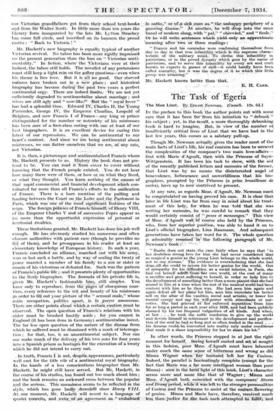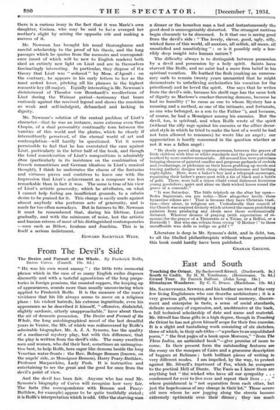The Task of Egeria
The Man Liszt. By Ernest :Newman._ (Cassell. 12s. 6d.) .
Ix the preface to this book the author points out with some care that it has teen fiti'lrom his'intention to " debunk " his subject ; yet, in the result, a more thoroughly debunking -book is hard to imagine. But, in view 'of the number of insufficiently critical lives of Liszt that we have had in the last few years, this comes as a salutary pull-up.
Though Mr. Newman actually gives the reader most of the main facts 'of Liszt's life, his rear concern has been to unravel
the complexities of the coinposer's two-main love-affairs- first with Marie d'Agoult, then with the Princess of Sayn-
Wittgenstein. It has been his task to show, with the aid
of the reeentry publistked_ letters and memoirs of the former, that Liszt was by no means the disinterested angel of
benevolence, forbearance and unworldliness that his bio- graphers, prompted by the Princess (a prize brouilleuse de cartes), have up to now contrived to present.
At any rate, as regards Mine. d'Agoult, Mr. Newman must
be congratulated-on having proved his case. It is clear that later in life Liszt was far froth easy in mind about his treat- ment of this lady, for when he- was -told that she was writing, her memoirs;; he • was careful to remark that they Would certainly consist of "poses et mensonges." This view of Mine. d'Agoult wairtiof course also held by the Princess, Who, froni her superior position, was able to hand it on to
Liszt's official biographer, Lina liaamann.. And subsequent generations have taken her word for it. The whole question is admirably resumed 'ii -'the following paragraph of Mi. Newirian'a book -tr.
. " Raabe does, not state 1 the ease fairly when he says that in her doubtless strong love for him she had never considered that so magical a genias as the young Liszt belongs to the whole world, not to one woman.' The evidence is overwhelming that she had done.all she could to secure his better genius for the world. Out of sympathy for his difficulties, as a social inferior, in Paris, she had cut herself acligt4rornilier own world, at the cost of many a sacrifice-and great sutfering to herself, in order to help him to the development of something better than a mere pianist that she had sensed in film at a time when the rest of the musical world had been content with him as he then was. She had seen him again and again defeat all her plaini for him, seen 'him immolate his better self on the altar of his vanities, social and artistic,- or lower his mental energy and !tap his will-power with stimulants or nar- cotics. She ' had grieved at her enforced separation'' from him for so long-a period in each year after /838', and had been publicly- shamed by his too frequent vulgarities of all kinds. And when, at last . . . he took the noble resolution to give up the world and-deviite himself 'iri,retirement to the development and purifica- tion of the soul he had so tong and so often trailed in the mud his dreams. could;-be; 'Converted into reality only under conditions- . that made it a sheer impossibility for her to share his lot."
In other words, the Princess stepped in at just the right moment for herself. Seeink: herself ousted and set at nought in this fashion, poor Mine. d'Agoult must have laboured under much the same sense of bitterness and wrong as did Minna Wagner when her huiband left. her for Cosima: Indeed, the parallel is fascinatingly complete (except for the fact that Marie was a far more intelligent woman than poor Minna) : seen in the hi/id-light-Of this book, Liszt's character seems more and more like. that of Wagner ; Minna and Mme. d'Agoult both coincided with the composers' Sturm ind Dram/period, 'wtde" it NiCELS left to the stronger personalities
of Cosirini and the Frince.ss to assist at the matare_flowering of genius. Minna and Marie have, therefore, received much
than-jastree fik.thejask.rach attempted -to' ftklett: and there is a curious irony in the fact that it was Marie's own daughter, Cosima, who may be said to, haj e avenged her mother's slight by seizing the opposite role and making a success of it.
Mr. Newman has brought his usual thoroughness and careful scholarship to the proof of his thesis, and the long passages which he quotes from the memoirs and correspond- ence (most of which will be new to English readers) both shed an entirely new light on Liszt and are in themselves fascinatingly interesting. In particular, they dispose of the theory that Liszt was " seduced " by Mme. d'Agoult : on the contrary, he appears in his early letters to her as the most ardent lover, pitching all his phrases in the highest romantic key (B major).' Equally interestingis Mr. Newman's disinterment of Theodor von Bernhardi's recollections of Liszt during the Weimar period—testimony that bears curiously against the received legend and shows the musician as weak and self-indulgent, debauched and lacking in dignity.
Mr. Newman's solution of the central, problem of Liszt's character—that he was an instance, more extreme even than Chopin, of a dual personality continually torn between the vanities of this world and the glories, which he clearly if intermittently perceived, of the eternal world of art and contemplation—will hardly be questioned. Yet it seems permissible to feel that he has overstated the case against Liszt, particularly in the latter half of the book, and though the brief consideration of Liszt's compositions is admirably (Rine (particularly in its insistence on the combination of French romanticism and German idealism in Liszt's musical thought), I think he underrates the charm of the fantasias and virtuoso pieces and contrives to leave one with the impression that Liszt's achievement as a composer was less remarkable than in fact it was. The same is true of his view of Liszt's artistic generosity, which he attributes, on what 1 cannot help feeling are inquilicient grounds, to a cabotin desire to be praised for it. This charge is easily made against almost anybody who performs acts of generosity, and is made far too often nowadays. But in fairness to Mr. Newman it must be remembered that, during his lifetime, Liszt gradually, and with the minimum of noise, lost the artistic and human esteem of most of his distinguished contemporaries —men such as Billow, Brahms and Joachim. This is in itself a serious indictment.
EDWARD SACKVILLE WEST.



















































 Previous page
Previous page